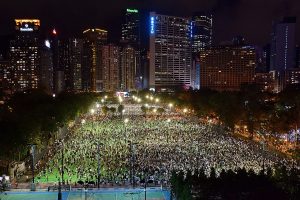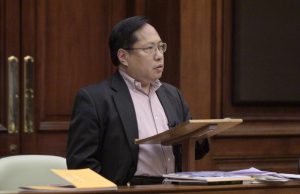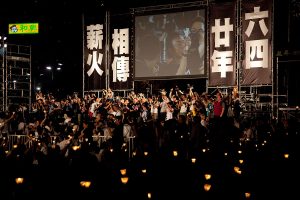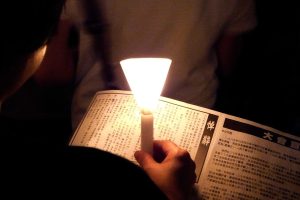Albert Ho Chun-yan was born in Hong Kong in the early 1950s, was educated locally and graduated from the law school of the then prestigious University of Hong Kong. He was admitted as a solicitor in 1977 and appointed a notary public of the common law in 1988. Over the past four decades, his litigation experience included cases in different areas and he served as a voluntary legal consultant in various charitable and non-governmental organisations. In the mid-1990s, he set up his own law firm, later to become one of the famous law firms located in Central on Hong Kong Island. He was amongst the first to support China’s ‘One Country, Two Systems’ and ‘Hong Kong People ruling Hong Kong’ principles, when he engaged with Britain to discuss the fate of Hong Kong, and led professionals to hold trainings across various professional sectors in Mainland China. Between 1998 and 2016, Ho was elected legislator in Hong Kong through direct election. Since 1991, he has represented Chinese victims of the Second World War, namely sex slaves (also known as ‘comfort women’) and victims of forced labour, and he travelled to Japan to claim compensation.
By now, one can only but imagine the comfortable retirement he must be enjoying for serving well the interests of the Chinese establishment in Hong Kong.
Yet, he is now in jail. One can then only but wonder “What are his offenses? How could a lawyer be so ‘careless’?”
There is another side of the story.
Ho co-founded the Democratic Party of Hong Kong, which later became the most influential party in Hong Kong’s Legislative Council in the 1990s. In early 2007, he established the China Human Rights Lawyers Concern Group (hereafter: the Lawyers Concern Group). Through reporting and supporting the actions of human rights lawyers in China, he hoped to introduce the rule of law and to advocate for the protection of human rights lawyers in Mainland China. He was the former chairman (2014–2019) and vice-chair (2019–2021) of the Hong Kong Alliance in Support of Patriotic Democratic Movements of China (hereafter: Hong Kong Alliance), that organised the annual candlelight vigil in Hong Kong’s Victoria Park to commemorate the 1989 Tiananmen Massacre.

© Photo: Baycrest / Wikimedia
Albert Ho Chun-yan is one of the most moderate members of Hong Kong’s pro-democracy camp. Yet, since May 2021, he has been serving a 18-months jail sentence, after he was sentenced by Judge Amanda Woodcock for “organising and inciting others to take part in an illegal assembly”. On 1 October 2019, the National Day of the People’s Republic of China, Ho and his colleagues from the Hong Kong Alliance staged a small-scale protest to raise awareness about human rights violations in China and express concern that there would not be any annual candlelight vigil as a result.
Since 2019, he has been facing various criminal charges for peacefully exercising his right to assembly.[1] How could an experienced lawyer, a popular politician and a devoted activist, who has tirelessly served the Hong Kong society for over four decades, end up in such misery? His upbringing and family background may provide some hints.
The lawyer
Albert Ho was born in Hong Kong, in a family with five other siblings. His father was forced to quit school due to the Sino-Japanese War. He learned English by himself and worked hard to support the family. Ho remembers that when he was young, his family shared a flat with other tenants in North Point, a neighbourhood on Hong Kong Island which used to be inhabited by lower-class migrants from mainland China. Thanks to his hardworking father, by the time he was in secondary school, his family could finally afford a decent flat in Kowloon Tong, one of Hong Kong’s affluent residential areas.
Ho admitted that he was rather laid-back during his primary and junior high school days. He was mostly daydreaming in school, wandering on the streets after class. His grades were so bad that he was not even qualified to attend the “entrance examination for secondary schools”. Fortunately, Kiangsu-Chekiang College kept him for a while, until his father arranged for him to transfer to Bishop Hall Jubilee School. In the new school, he met a group of classmates who took studying seriously and shared a common hobby: learning martial arts together in their leisure time. His grades gradually improved. Ho stayed at the same school until he was admitted to the Faculty of Law of the University of Hong Kong.
In 1966, the Cultural Revolution broke out in China. Many mainland Chinese fled from irrational and violent ‘class struggle’ and came to Hong Kong. In Hong Kong, riots led by pro-Communist protestors against the British colonial government left many killed and injured. As a high school student, Ho started to question the nature of the Chinese Communist Party (hereafter: CCP). He attended private lectures by history professor Hsu Kwan-san given at his home for interested high school level students. Hsu taught them historic methodology and how to analyse the CCP’s rhetoric and struggles, while his wife, Mrs. Hsu, taught them Mandarin, the official language spoken in Mainland China. Ho recalled that Professor Hsu did not only offer him a solid understanding of China’s modern history, but also made him committed to truth-seeking and to serving society, nurturing his Chinese national sentiment.
As Hong Kong started industrialising and modernising in the 1960s-1970s, Ho went to visit China. He found that his relatives and friends in Mainland China were impoverished, with laws and regulations constantly changing to benefit the most privileged groups. He felt very fortunate to grow up in Hong Kong: the idea of giving a helping hand to China’s modernisation began to sprout.

© Used with permission of The 29 Principles
Ho could not identify a specific event or moment which put him on the road of political activism. Since he was a child, he enjoyed reading martial arts novels, which helped him ‘distinguish what’s right from what’s wrong’ and encouraged him to always help the most vulnerable. Often bullied in his youth for being short, he started to understand the ‘helplessness of the disadvantaged.’ Growing up, he could witness how others were treated unfairly, and always hoped that he could get involved and ‘set things right again’[2].
As a lawyer, people from all walks of life came to ask him for help. They might have different political views and beliefs, yet he did his utmost to seek justice for his clients. Over time, more and more people sought help from him, yet he seldom would turn them down. Despite being very busy, he was passionate about his work and gradually became influential in the legal sector, in politics and across civil society.
Ho’s father opposed his involvement in politics because he believed politicians must learn to play with power and that would not be suitable for an honest person like his son. However, Ho believed that with this thinking, politics would be plagued with dishonest individuals fighting for power.
In the late 1970s, China began to open up after Mao Zedong’s death. Ho was particularly impressed by Deng Xiaoping’s principles of ‘One Country Two Systems’ and ‘Hong Kong people ruling Hong Kong’ around Hong Kong’s handover. As a lawyer at the time, he began to build connections, and started leading professionals to provide training in Mainland China in the early 1980s. At that time, many industries in China operated inefficiently and lacked clear protocols: Hong Kong professionals trained employees of banks, hospitals, airports and other fields, hoping to lay the ground for China’s modernisation. Had the June 4th massacre not happened, Ho would have likely been invited to join the CCP, only to become part of today’s Hong Kong political elite.
The activist

© Photo: Kap Leung / Wikimedia
The June 4th Massacre in 1989 was a turning point. When Ho saw the Chinese government shooting at unarmed civilians, he knew his honeymoon with the CCP was over. He cut off his connections with the CCP and demanded it vindicate the June 4th victims. The handover was imminent and Ho realised that Hong Kong would eventually fall into the hands of the CCP. Yet, he had no plan to leave. Instead, he decided to make Hong Kong his base to safeguard the truth about the June 4th Massacre by making use of his legal knowledge and Hong Kong’s sound rule of law. He hoped that the freedom Hong Kong people enjoyed could serve as an example for China to follow and evolve.
Ho believes that people from mainland China and from Hong Kong all long for democracy, freedom and the rule of law: as long as there is no democracy, freedom and rule of law in China, Hong Kong can never be truly democratic, free and just. Such a belief distinguishes him from the younger generation of pro-independence Hong Kong localists and supporters, less interested in China’s democratic struggle. Despite this generational gap and disagreements between pro-independence supporters and who they call ‘Chinese patriot’ Ho, the latter has never stopped fighting for their freedom of speech, urging the government to allow for discussion on these issues, and criticised the police’s excessive use of force against protestors, assisting those prosecuted by the authorities.
In February 2006, Gao Zhisheng, a prominent human rights lawyer in China, invited Albert Ho to join a hunger strike launched by human rights lawyers in China to protest the police’s brutality against activist Guo Feixiong. Since then, Ho has maintained a 24-hour hunger-strike every week in the years after, in support to human rights lawyers and activists in China. In August 2006, Ho was attacked by a gang of thugs with batons and baseball bats in a crowded McDonald restaurant in Central Hong Kong. He suffered severe injuries at his head, nasal bridge and lips, was hospitalised for several days and underwent surgery. Still, Ho continued his weekly hunger strike during his hospitalisation. This assault made him better realise the difficult and dangerous environment in which human rights lawyers in China operated. As a result, he contributed in creating the China Human Rights Lawyers Concern Group in early 2007, to lobby legal professionals in Hong Kong to support their counterparts in China. He hoped to support rule of law in China through peaceful and civilised measures.
Despite being framed as being ‘anti-China’, the Lawyers Concern Group strived to promote human rights progress and to improve China’s legal system, through awareness-raising on human rights litigation in China, humanitarian, legal and psychological support to lawyers and their relatives, and promoting exchanges with Taiwanese counterparts, as well as providing training on UN and international mechanisms.
Fighting for the truth
Human Rights First granted Albert Ho the 2020 Baldwin Medal of Liberty Award in recognition of his contributions to human rights in Hong Kong and China over the years.[1] At that time, Ho faced increasing danger, including several physical assaults (he was attacked during the Anti-Extradition Bill Movement in 2019) and political repression. As China is gradually stifling Hong Kong people’s freedom of expression and the city’s rule of law, Hong Kong police arbitrarily detains protestors, and dissidents are targeted by groundless lawsuits, a growing phenomenon under the National Security Law era since 2021. Human rights lawyers in Hong Kong are compelled to share the same fate as their counterparts in China.
In various interviews shortly before his sentence, Ho indicated his exhaustion after repeatedly visiting friends in different prisons and detention centres, and representing protestors in courtrooms. Preparing for the possibility of an arrest, Ho asked his doctors to prescribe the necessary medicines he would need in jail to treat his lung cancer recovery. Compared with his comrades, he considered himself lucky, old enough to retire, and having grown-up children already: ‘I have been in the democratic movement for many years and I am still a free man. I have been lucky. In many other places, people who fight for democracy are all jailed.’ Most of his friends and fellow members of the Democratic Party are now behind bars; Hong Kong Alliance, an organisation he was once chair-person and vice-chair of, and the Lawyers Concern Group, which he co-founded and had particular affection for, were forced to disband. He sighed and said that in today’s Hong Kong, justice is being locked up.
According to Ho’s colleague, even on the eve of his arrest, he was rather worried about the fate of Chinese human rights lawyers and the defendants he represented. When foreign lawyers’ organisations asked him if he needed help, he declined and asked them to focus on helping human rights lawyers in China.

© Photo: Ethan Kan / Wikimedia
Ho’s message to the Hong Kong people is: remain hopeful, uphold the basic principles of human rights and democracy, be brave to take up duties and live up to the truth. As a defendant in the courtroom in 2021, Ho described his participation in the Hong Kong Alliance’s banned Tiananmen Massacre vigil as ‘driven by our consciences and moral commitment, to do our utmost to maintain this historic tradition of commemorating June 4th, remembering this lesson of History and speaking truth to power.’ He was prepared to be sentenced without asking for leniency.
This story was written by The 29 Principles. Read more stories in our series of Chinese lawyers’ profiles here.
[1] By the end of 2021, Albert Ho was charged with knowingly participating and inciting others to participate in illegal assemblies on 18 August, 1 October, 20 October 2019, and 4 June 2021. He was sentenced to 12 months in prison (suspended for two years) for the first offense; 18 months in prison for the second offense and was then immediately imprisoned; for the third and fourth offenses, he was sentenced to 16 months and 10 months in prison respectively.
In addition, Lee Cheuk-yan, Albert Ho and Chow Hang-tong, being the chairman and two vice-chairs of HKA were charged with “inciting subversion of State power.” The indictment states that they were suspected of inciting others to subvert the Chinese regime in Hong Kong between 1 July 2020 and 8 September 2021. Under the offense “inciting others to subvert State power”, if the circumstances are serious, they shall be sentenced to five to ten years in prison. Hearings of this case has started in January 2022. The 29 Principles will continue to monitor and report on the case.
[2] Albert Ho handled inquests on behalf of victims’ families at the coroner’s court, with cases involving domestic violence, homicide, industrial accidents and medical malpractice frequently, some of them drew extensive media attention. He has also represented defendants in disciplinary proceedings and tribunal appeals, and handled a large number of land and building management disputes. Extracted from https://hotsewai.com.hk/zh/何俊仁律師/, accessed on 10 December 2021.
Article also available in





